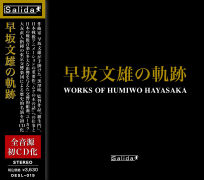- HOME
- SHOPPING
- Pre-Order (Upcoming)
- Pre-Order Imported
- Pre-Order Japanese
- New Releases
- New Imported
- New JPN Movie & TV
- New JPN Anime
- New JPN Game
- New Blu-ray/DVD/etc.
- Imported CDs
- Japanese Releases
- Japanese Movie & TV
- Foreign Movie & TV
- Anime
- Game
- Blu-ray/DVD/etc.
- Shopping Cart
- SPECIAL
- Feature Articles
- On Sale
- INFORMATION
- About Us
- Service Center
- News & Information
- Contact Us
- Mail News
- Japanese Site
- Close MENU

Composer Fumio Hayasaka's work on Akira Kurosawa's "Rashomon" and the important Japanese postwar animation work "The Story of Muku no Ki", as well as the "Symphonic Suite "Yukarra"", which had a great influence on Japanese postwar music, are now available for the first time on CD in a historical masterpiece performed by the Tokyo Symphony Orchestra under the direction of Naoto Otomo!
Track ListTokyo Symphony Orchestra performance "Evening of Contemporary Japanese Music Series No. 18: Fumio Hayasaka 60th Anniversary of His Death Concert".
Held in October 2015, the 60th anniversary of composer Fumio Hayasaka's death, the concert featured "Bolero from the Scene of the Testimony of Masago," the film music for Akira Kurosawa's "Rashomon," "Symphonic Fairy Tale: The Story of Mukutoki," "Symphonic Suite: Yukara," and these important works left by Hayasaka.
Thanks to the sincere support of the Tokyo Symphony Orchestra, we have been able to find the recordings of the "Fumio Hayasaka 60th Anniversary Concert" nearly 10 years after the concert was held.
Starting with the film "The Drunken Angel," Akira Kurosawa and composer Fumio Hayasaka are known as a legendary duo who created a stir in Japanese cinema with such films as "Stray Dog," "Ikiru," "Seven Samurai," and "Record of a Living Thing.
Among them, "Rashomon" (1950), which won the Golden Lion at the 12th Venice International Film Festival, made Akira Kurosawa and Fumio Hayasaka famous throughout the world and brought international fame to postwar Japanese cinema.
In the film, when Masago (Machiko Kyo), who claims that she was assaulted by Tajomaru (Toshiro Mifune), is gradually absorbed in a state of intoxication and elation, Akira Kurosawa requested "music like Ravel's 'Bolero'" and Fumio Hayasaka responded to this difficult challenge by composing "Bolero for the scene of Masago's testimony". Fumio Hayasaka responded to this difficult challenge by composing "Bolero" for the scene of Masago's testimony.
Muku no ki no hanashi" (The Story of the Muku Tree), a "formative technology film" (produced by Toho Kyoiku Eigabu) that uniquely combines celluloid animation and live-action.
The story of this film, which was released in 1947, shortly after the end of World War II, is that the winter demon "Ice Demon" appears in the wilderness where the Muku trees have been standing for years and transforms the world into a frozen world of death, but a goddess appears and through her power, the Ice Demon and the world are thawed out. The simple story, however, is intended to express the anger at the oppression of war and the liberation from its control.
The film has no dialogue or sound effects, and the music takes the place of these sounds as the story unfolds along with the images. The work fully showcases Fumio Hayasaka's intuition and orchestration techniques, cultivated through his work in film music.
The title of the score, which Fumio Hayasaka wrote on the cover of the film, is "A Symphonic Fairy Tale". ---The title of the work, which Fumio Hayasaka wrote on the cover of the score, is "A Symphonic Fairy Tale: The Tale of the Muku Tree".
Pan-Orientalism" is a statement by Fumio Hayasaka about his creative attitude in the late 1950s, the last years of his short life.
In the process of pursuing "Pan-Orientalism," Hayasaka believed that a new style of Oriental music must be conceived by combining Japanese characteristics summarized as "simplicity," "infinity," "irrationality," "vegetal sensibility," and "flatness," with the musical styles of the twentieth century.
This work was composed as a "symphonic suite" based on Kyosuke Kindaichi's "The Epic of the Ainu, Yukara" (Iwanami Bunko), with an introduction to five selected pieces from the same book, and uses a musical language that is distinctly different from Hayasaka's previous works, and is known as a work that represents a new frontier for Hayasaka Fumio.
The premiere of "Symphonic Suite 'Yukara'" had a great influence on Japanese musicians, especially on Keijiro Sato, Hiroyoshi Suzuki, Toru Takemitsu, and Joji Yuasa, members of the experimental group "Experimental Studio," with whom Fumio Hayasaka was in close contact. His creative concept based on "Pan-Orientalism" was developed and passed down from generation to generation after the "Experimental Studio," and eventually came to form one of the extremes of postwar music in Japan.
Although "Symphonic Suite 'Yukara'", Fumio Hayasaka's last work of pure music, is an important work in the history of Japanese music, only one concert recording of its performance has ever been made available on disc.
In order to overcome this situation, the Tokyo Symphony Orchestra, which commissioned and premiered "Symphonic Suite 'Yukara'" in the past, has kindly agreed to release a CD of this wonderful performance.
This is a must-hear CD that will make you take a fresh look at "Fumio Hayasaka, Composer".
[Machine Translation]
1. "Bolero in the scene of Masago's testimony" from "RASHOMON" (1950) [9:13]
2. Symphonic fairy-tale "The Story of the Muk Tree" (1946) [20:54]
Symphonic Suite "YUKARR" (1955)
3. Prologue [4:56]
4. Hanrocca [6:11]
5. Santatripaina [6:20]
6. Hanchikky [7:34]
7. Nopae [12:09]
8. Kenepetzii [9:49]
Conductor: Naoto Otomo, Tokyo Symphony Orchestra
Recorded on October 10, 2015 at MUZA Kawasaki Symphony Hall
An Evening of Contemporary Japanese Music Series No. 18: Fumio Hayasaka 60th Anniversary Concert
* Sound courtesy of Tokyo Symphony Orchestra